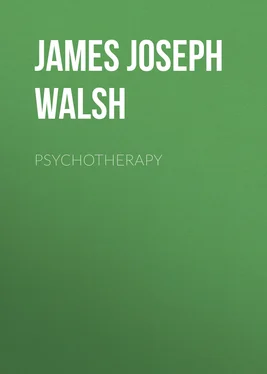James Walsh - Psychotherapy
Здесь есть возможность читать онлайн «James Walsh - Psychotherapy» — ознакомительный отрывок электронной книги совершенно бесплатно, а после прочтения отрывка купить полную версию. В некоторых случаях можно слушать аудио, скачать через торрент в формате fb2 и присутствует краткое содержание. Жанр: foreign_prose, psy_theraphy, foreign_edu, foreign_antique, на английском языке. Описание произведения, (предисловие) а так же отзывы посетителей доступны на портале библиотеки ЛибКат.
- Название:Psychotherapy
- Автор:
- Жанр:
- Год:неизвестен
- ISBN:нет данных
- Рейтинг книги:4 / 5. Голосов: 1
-
Избранное:Добавить в избранное
- Отзывы:
-
Ваша оценка:
- 80
- 1
- 2
- 3
- 4
- 5
Psychotherapy: краткое содержание, описание и аннотация
Предлагаем к чтению аннотацию, описание, краткое содержание или предисловие (зависит от того, что написал сам автор книги «Psychotherapy»). Если вы не нашли необходимую информацию о книге — напишите в комментариях, мы постараемся отыскать её.
Psychotherapy — читать онлайн ознакомительный отрывок
Ниже представлен текст книги, разбитый по страницам. Система сохранения места последней прочитанной страницы, позволяет с удобством читать онлайн бесплатно книгу «Psychotherapy», без необходимости каждый раз заново искать на чём Вы остановились. Поставьте закладку, и сможете в любой момент перейти на страницу, на которой закончили чтение.
Интервал:
Закладка:
There is another class in whom familiarity with drugs has become a serious matter. They are the patients who have made the rounds of physicians, have learned to read prescriptions, have looked up the significance of the various remedies that they have seen prescribed, have heard doctors talk about them, and remember only what is depreciatory, and who critically examine a prescription and conclude that the remedies recommended are not likely to do them good. Every physician knows the hopeless condition such patients are in. Mental attitude will greatly help drugs, and it can utterly undo the effect of all drugs except those which have certain drastic mechanical effects. Drug failure in these cases is another illustration of how much psychotherapy means in connection with drug treatment.
Not only is there no intent, then, to lessen respect for drugs in this textbook of psychotherapeutics, but the one thing that the author would like to emphasize is the necessity for giving drugs in sufficient doses. Recommendations in text-books of medicine are often vague in their indications as to dosage, and surprisingly small doses are, in consequence, sometimes prescribed. Practically the only remedial element of such small doses is the mental effect on the patient, whereas a combination of pharmaceutic and psychotherapeutic factors would be much more efficacious. It is not unusual to find that the patient who is supposed to be taking nux vomica as an appetizer or a muscle tonic, or in order to produce heart equilibrium in the cardiac neuroses, is getting five drops, two and a half minims, three times a day, when he should be getting at least twenty drops with the same frequency. I have known a physician to prescribe ten grains of bromid where thirty to sixty grains should have been prescribed, and such valuable pharmaceutic materials as bismuth and pepsin are often given in doses so small that they preclude all possibility of benefit except by mental influence.
With therapeutic nihilism or skepticism of the power of drugs I have no sympathy. As a teacher of medicine I have for years emphasized the necessity of the use not of conventional doses of drugs for every patient, but of doses proportioned to the body weight. It seems to me quite absurd to give the same amount of a drug to a woman who weighs a hundred pounds and to a man who weighs two hundred and fifty pounds of solid muscular tissue. I believe in using drugs well up to their physiological effects if the drugs are really indicated.
With regard to other modes of treatment the same thing is true. Where they are indicated, balneo-therapy, hydro-therapy, mechano-therapy, electro-therapy, massage, and all the forms of external treatment, should be used rationally and not merely conventionally. The individual and not his affection must be treated. In all of these methods there is a psychotherapeutic element, and for the benefit of the patient this, too, must be recognized and used to its fullest extent.
Supposed Novelties in Mind Healing.—We hear much of mental healing, of absent treatment, of various phases of suggestion, and of the marvelous therapeutic efficiency of complete denial of the existence of evil, and sometimes we wonder whether all these things are not offshoots of our recent growth in the knowledge of psychology. It is possible, however, to find, masquerading under the head of the efficacy of nostrums in the past, the equivalents for all the activities of mental healing of the present. It all depends on what is the scientific fad of the hour. If it is electricity, then some mode of electrical treatment serves the purpose of suggesting cure, and relief of symptoms follows. If drug treatment of any particular kind is attracting much attention, then the suggestion is most effective that is founded on this basis. Perkins' tractors or the Leyden jar are effective at one time, radium or the X-rays at another, sarsaparilla or dilute alcohol at another, while a generation that is much interested in psychology may find, as ours does to a noteworthy degree, quite sufficient favorable suggestion for the cure of many ills in purely psychic influences, either direct or indirect, deliberate or unconscious.
Men and women do not change, their ills are about the same, and except for certain definite scientific remedies it is only the superficial mode of treatment that differs very much. Psychotherapy has always been an important element in most of the therapeutics of history. With so much accomplished in the past by indirection, there can be no doubt but that important advances in psychotherapeutics must result from the extension of its deliberate use.
We have not yet reached a point in our knowledge of the mode of the influence of the mind on the body that will enable us to treat this large subject in a scientific manner. What has been written is set down rather as suggestive than conclusive. There is almost nothing that the human mind cannot do, its power ranging from the ability to delay death for hours or even days to causing sudden or unlooked for death under strong emotional strain. But we are as yet without definite data as to the possibilities of the immense power for good, and also for ill, that lie unrevealed in this domain. Anything that makes for observations by a large body of trained observers in a large number of cases will almost surely serve to bring about a development of this subject of valuable practical application.
Psychotherapy is open to large abuse. It will happen that men who are not trained in diagnosis will occasionally try to use psychotherapeutic means when what is needed is the knife, the actual cautery, a good purge, some strong drug, or other efficient remedy whose value has been demonstrated and which any trained physician can use. It will also happen that men who lack tact will occasionally disturb patients' minds still further by what they say to them in a mistaken attempt at psychotherapy, and will sometimes suggest other symptoms and make sufferers worse by their clumsy attempts to remove symptoms that are already present. Every good thing, however, is open to the same objection. Even good food is abused. The use of drugs has been so abused that the abuse has done much to discredit medicine at many periods. There is a Latin proverb which says: "From the abuse of a thing no argument against its use can be drawn." We cannot prevent liability to abuse, and psychotherapy is sure to meet that fate. It has been abused in the past, and is abused now, and always will be abused, but formal study of psychotherapy and its deliberate employment will do more than anything else to limit the inevitable abuse.
If its place in history and in medicine is definitely set forth, its problems squarely faced and their solutions definitely suggested, it is much less likely to be misused. At least, then, the whole subject is open for free and frank discussion and for such additions and subtractions as may make this department of therapeutics as important, or at least in a measure as valuable, as climato-therapy or balneo-therapy or mechano-therapy or electro-therapy. The development of each of these subjects has proved helpful. It is true that each specialist has, in the eyes of his colleagues in general practice, exaggerated the significance of his own department. This is true in all specialties, however, and psychotherapy deserves quite as much as any of the subjects we have mentioned to have a place among the text-books of medicine; and so this one is committed to the judgment of clinical observers. Long ago Horace said:
Si quid novisti rectius his candidus imperti
Si non his utere mecum.
HISTORY OF PSYCHOTHERAPEUTICS
SECTION I
PSYCHOTHERAPY IN THE HISTORY OF MEDICINE
CHAPTER I
GREAT PHYSICIANS IN PSYCHOTHERAPY
Интервал:
Закладка:
Похожие книги на «Psychotherapy»
Представляем Вашему вниманию похожие книги на «Psychotherapy» списком для выбора. Мы отобрали схожую по названию и смыслу литературу в надежде предоставить читателям больше вариантов отыскать новые, интересные, ещё непрочитанные произведения.
Обсуждение, отзывы о книге «Psychotherapy» и просто собственные мнения читателей. Оставьте ваши комментарии, напишите, что Вы думаете о произведении, его смысле или главных героях. Укажите что конкретно понравилось, а что нет, и почему Вы так считаете.












